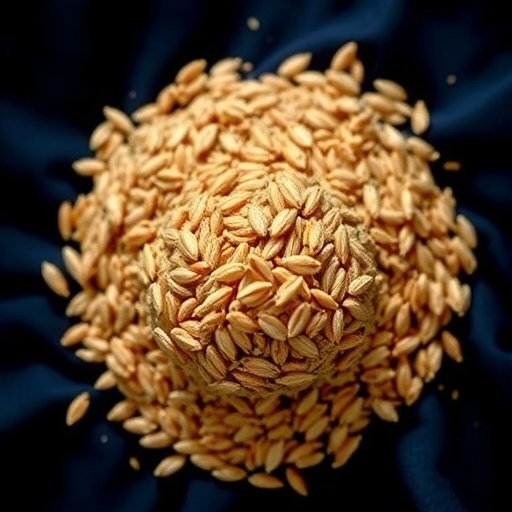Recent research has brought to light the neuroprotective properties of rice bran extract, a finding that has significant implications for treating neuroinflammatory conditions. The study, conducted by a team of researchers including El-Nagah, Abdel-Halim, and Heikal, delves deep into the mechanisms through which rice bran extract operates in a neuroinflammatory mouse model. With neurological disorders on the rise globally, understanding how natural products like rice bran can offer therapeutic benefits is becoming increasingly relevant.
Rice bran, a byproduct of the rice milling process, is already known for its nutritional benefits, rich in antioxidants, vitamins, and essential fatty acids. However, its potential in combating neuroinflammation has not been extensively explored until now. By conducting experiments on a mouse model, the researchers aimed to illuminate the extent to which rice bran extract can mitigate neuroinflammatory responses, potentially paving the way for new treatment modalities.
The neuroinflammatory model used in this study mimics conditions such as Alzheimer’s disease and multiple sclerosis, diseases that are characterized by chronic inflammation in the central nervous system. Previous research has established that inflammation plays a pivotal role in exacerbating these conditions. Therefore, the introduction of rice bran extract represents a promising avenue for therapy, as it may help lower the inflammatory response and promote neuroprotection.
One of the striking findings from this study is that the active compounds found within rice bran – including phenolic acids, flavonoids, and dietary fibers – may significantly contribute to the observed neuroprotective effects. These compounds act as potent antioxidants, neutralizing free radicals and reducing oxidative stress, a significant contributor to neuronal damage. The researchers observed a notable decrease in markers of oxidative stress in the treated mice, highlighting the extract’s ability to provide a protective barrier against cellular damage.
Moreover, the results indicated that administering rice bran extract led to a reduction in pro-inflammatory cytokines, which are signaling molecules that exacerbate inflammation in the nervous system. By inhibiting these cytokines, the extract may help modulate the immune response, thereby mitigating the effects of neuroinflammation. This could open the door for novel treatments that leverage the anti-inflammatory properties of rice bran for conditions where inflammation is a driving factor.
The researchers also explored the biochemical pathways involved in the neuroprotective effects of rice bran extract. They identified several signaling pathways that were activated in the presence of the extract, shedding light on the molecular mechanisms through which rice bran exerts its beneficial effects. This aspect of the study is particularly crucial for the scientific community, as it lays the groundwork for further investigations into the specific constituents of rice bran that may be responsible for these remarkable outcomes.
Importantly, the study goes beyond mere animal models. The potential for translating these findings into human applications is significant. If rice bran extract can be confirmed to elicit similar effects in human subjects, it could lead to dietary interventions or supplementary treatments aimed at reducing neuroinflammation in at-risk populations. Understanding how such natural products can be integrated into standard care protocols could profoundly impact the future of neurodegenerative disease management.
The implications of these findings extend to public health as well. As the global population ages and the incidence of neurodegenerative diseases increases, there is an urgent need for effective, accessible treatments. Utilizing a natural product like rice bran could provide a dual benefit: offering therapeutic effects while also being cost-effective and largely devoid of the side effects commonly associated with synthetic medications.
The study proclaims a pivotal shift in our understanding of how dietary components can influence neurological health. Emphasizing preventative approaches, researchers urge the need for further clinical trials to solidify the evidence surrounding rice bran’s efficacy. As we await these developments, incorporating rice bran and its constituents into our diets could serve as a proactive measure in safeguarding our neurological well-being.
As researchers continue to explore the multifaceted roles of food-derived compounds in health and disease, the potential of rice bran remains a beacon of hope. The natural synergy of its components presents a promising frontier in neuroprotective research, poised to transform our approach to managing neuroinflammatory conditions.
In conclusion, the study conducted by El-Nagah, Abdel-Halim, and Heikal marks a significant achievement in uncovering the neuroprotective role of rice bran extract. The findings not only emphasize the importance of natural dietary interventions but also serve as an invitation for further research into the vast potential residing within plant-based compounds. The road ahead is filled with promise, as science continues to unlock the secrets of nature, transforming our understanding and approach to neurological health.
Subject of Research: Neuroprotective role of rice bran extract in neuroinflammatory conditions.
Article Title: Neuroprotective role of rice bran extract and its constituents in a neuroinflammatory mouse model.
Article References:
El-Nagah, S.M.A., Abdel-Halim, M., Heikal, O.A. et al. Neuroprotective role of rice bran extract and its constituents in a neuroinflammatory mouse model.
BMC Complement Med Ther 25, 351 (2025). https://doi.org/10.1186/s12906-025-05097-1
Image Credits: AI Generated
DOI: 10.1186/s12906-025-05097-1
Keywords: rice bran extract, neuroprotection, neuroinflammation, antioxidants, cytokines, dietary intervention, neurological health.




